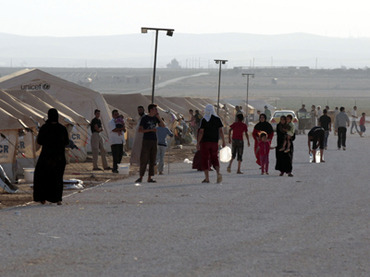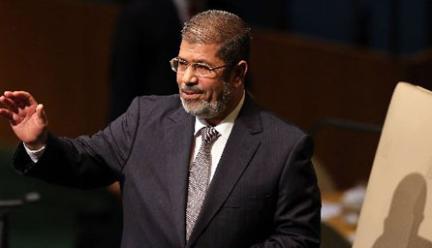By Serge Daniel / AFP
BAMAKO: Mali’s Tuareg rebels vowed to press on with a campaign to seize the north as putschists faced a global backlash Friday with Europe suspending aid and African security chiefs calling an emergency meeting.
The website of the National Movement for the Liberation of Azawad (MNLA) said it “will continue the offensive to dislodge the Malian army and its administration from all the towns of Azawad” — the name for their professed homeland in the northern triangle of the bow-tie shaped west African nation.
The Tuareg offensive sparked a coup on Thursday by soldiers angry at the government’s handling of the conflict and President Amadou Toumani Toure was forced to flee.
“The military coup d’etat changes nothing for the MNLA, which is defending Azawad for its self-determination and independence,” said a statement signed by spokesman Bakaye Ag Hamed Ahamed.
It said the rebels had on Thursday seized the town of Anefis on the national highway linking Gao and Kidal — the main cities in the vast desert north.
The spokesman said the soldiers were rebelling after their “crushing defeat in Azawad.”
The European Union’s executive arm meanwhile said it was halting development operations temporarily as EU foreign ministers called for the return of civilian rule.
“Following yesterday’s coup d’etat in Mali, I decided to suspend temporarily European Commission’s development operations in the country until the situation clarifies,” said EU Development Commissioner Andris Piebalgs.
The EU stressed that direct support to the population would continue as well as humanitarian aid. Mali is threatened with a food crisis due to drought.
The European Union’s executive arm planned to allocate €583 million ($772 million) of development aid to Mali between 2008 and 2013.
Mali’s woes are viewed as a fallout of the demise of Moammer Qaddafi’s regime, which employed the nomadic Tuareg who returned armed and jobless from Libya to their desert homes last year and resumed a decades-long independence battle.
The military, one of the continent’s weakest according to analysts, was overwhelmed. It has blamed the government for lack of support to battle the Tuareg rebels.
The international community reacted swiftly, roundly condemning the military junta, while the World Bank and African Development Bank suspended development aid after Mali’s first coup in 21 years.
China added to the critique which has poured in from the United Nations, France and across Africa.
“We oppose unconstitutional takeover of power,” foreign ministry spokesman Hong Lei told reporters, calling for a “return to normal order.”
In Addis Ababa, the African Union’s Peace and Security Council was planning to meet on Friday, after the continental body ordered “the mutineers immediately to put an end to their action.”
Amnesty International said at least three people had been shot dead, with 28 wounded, while the Red Cross in the country said it had treated 40 people for mostly bullet wounds.
A mutiny by angry soldiers turned into a full blown coup early Thursday as they attacked the presidential palace and seized state institutions before appearing on television to announce the toppling of an “incompetent” regime.
Junta spokesman Lieutenant Amadou Konare said the takeover was because of a “lack of adequate (military) material to defend the nation.”
The man presented as their leader, Captain Amadou Sanogo, declared a national curfew as the rebels announced all borders had been closed until further notice.
Sanogo on Friday said the government leaders being held were “safe and sound.”
“We will not touch a hair on their heads. I will hand them over to the courts so that the Malian people know the truth,” Sanogo told AFP in an interview at a military barracks near the capital.
On Thursday president Toure was said to be in a safe location, with a member of his entourage putting him in a military barracks in the capital under protection from his elite “Red Beret” paratroopers. It is not clear if he is still there.
Mali is usually seen as politically stable, but unrest in the north, where Tuareg tribes have long felt ignored by a southern government and where Al-Qaeda has also taken root, has created a major security problem.
Under Toure’s leadership, Mali — which has battled successive Tuareg rebellions since independence and more recently Al-Qaeda in the Islamic Maghreb — has been hailed as a growing democratic success.
But in mid-January the Tuareg launched a fresh rebellion for independence.
The fighting has forced as many as 206,000 people to flee their homes, compounding a humanitarian disaster at a time of drought and food shortages, according to the United Nations.

